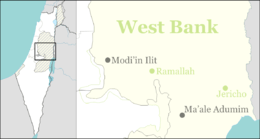Hashmonaim
| Hashmonaim חַשְׁמוֹנָאִים | |
|---|---|
| Hebrew transcription(s) | |
| • unofficial | Ramat Modi'in |
 | |
 Hashmonaim | |
| Coordinates: 31°55′51.65″N 35°1′17.66″E / 31.9310139°N 35.0215722°ECoordinates: 31°55′51.65″N 35°1′17.66″E / 31.9310139°N 35.0215722°E | |
| District | Judea and Samaria Area |
| Council | Mateh Binyamin |
| Region | West Bank |
| Founded | July 7, 1988 |
| Population (2015)[1] | 2,762 |
Hashmonaim (Hebrew: חַשְׁמוֹנָאִים, lit. Hasmoneans) is an Israeli settlement located in the western section of the West Bank, off Route 443. Hashmonaim is located two kilometers east of Modi'in-Maccabim-Re'ut, midway between Jerusalem and Tel Aviv and is under the jurisdiction of the Mateh Binyamin Regional Council of Israel. In 2015 it had a population of 2,762.
The international community considers Israeli settlements in the West Bank illegal under international law, but the Israeli government disputes this.[2]
History
Construction of the first homes began in December 1983. A dedication ceremony on June 12, 1984, was attended by Prime Minister Yitzhak Shamir and the Sephardi chief rabbi Mordechai Eliyahu. The first families moved in on August 1987. The name derives from the location of Hashmonaim in a region where the Hasmoneans lived in antiquity.[3]
Hashmonaim originally consisted of two neighborhoods: Ramat Modi'in was established in 1983 and Ganei Modi'in in 1985. In 1996, Ganei Modi'in became part of Modi'in Illit.[4]
In May 2010, three homes in Hashmonaim were demolished by Israeli security forces. The buildings were deemed to be violating a 10-month construction freeze in the West Bank.[5]
Demographics
In 2010, there were 545 families living in Hashmonaim. Around 50% of the residents are native English speakers.[6] Most are members of the religious Zionist community. Many residents commute to jobs in the United States or work for American companies.[7]
Status under international law
Like all Israeli settlements in the Israeli-occupied territories, the international community considers Hashmonaim to violate the Fourth Geneva Convention's prohibition on the transfer of an occupying power's civilian population into occupied territory and are as such illegal under customary international law.[8] Israel disputes that the Fourth Geneva Convention applies to the Palestinian territories as they had not been legally held by a sovereign prior to Israel taking control of them. This view has been rejected by the International Court of Justice and the International Committee of the Red Cross.[9][10]
Communal services
There are ten synagogues in Hashmonaim: four Ashkenazi, three Sephardi, two Yemenite and one Chabad.[6] Hashmonaim has five kindergartens, a religious elementary school, and a high-school yeshiva, which attracts boys from all over the Binyamin Region. The community also has a clubhouse for young people, a separate Bnei Akiva branch, two basketball courts, a baseball field, playgrounds, a library and a fitness center.[7]
Transportation
The drive from Hashmoniam to Jerusalem, Tel Aviv, Petah Tikva and Ariel, is approximately thirty minutes by car. Bus connection is also available.
Sports
The Hashmonaim Titans are a local baseball team, part of the annual league run by the Israel Association of Baseball.[11]
References
- ↑ "List of localities, in Alphabetical order" (PDF). Israel Central Bureau of Statistics. Retrieved 16 October 2016.
- ↑ "The Geneva Convention". BBC News. 10 December 2009. Retrieved 27 November 2010.
- ↑ Ayalon Valley - On the Maccabee trail
- ↑ "Case study: The Modi'in Illit Bloc" (PDF). B'Tselem. December 2005. Retrieved August 24, 2012.
- ↑ "Israeli Forces Demolish Settlement Homes". May 9, 2010. Retrieved August 24, 2012.
- 1 2 Morad, Tamar (Nov 26, 2010). "Little America, just over the Green Line". Haaretz. Retrieved August 24, 2012.
- 1 2 Berman, Daphna (November 16, 2007). "'The best place to raise your kids'". Haaretz. Retrieved August 12, 2008.
- ↑ Westcott, Kathryn (December 19, 2003). "The settlers' struggle". BBC News. Retrieved August 24, 2012.
- ↑ Legal Consequences of the Construction of a Wall in the Occupied Palestinian Territory International Court of Justice, 9 July 2004. pp. 44-45
- ↑ Opinion of the International Court of Justice B'Tselem
- ↑ Freund, Michael (May 24, 2010). "Time for Israel to Take Up Baseball". RealClearWorld. Retrieved August 24, 2012.